- 16:30 - 17:15 Uhr | “The Metastatic Niche in Pediatric Cancer: Immune Interactions and Implications“
Sabine Taschner-Mandl, Tumor Biology, Children’s Cancer Research Institute (CCRI), Vienna
- 17:15 - 18:00 Uhr | “Targeting the immunosuppressive tumor microenvironment using MISTRG-6 humanized mice”
Dietmar Herndler-Brandstetter, Cellular and Molecular Tumor Biology, Center for Cancer Research, Medical University of Vienna
- 18:00 - 18:30 Uhr | Get-together

Sabine Taschner-Mandl, Children’s Cancer Research Institute (CCRI), Vienna
The Metastatic Niche in Pediatric Cancer: Immune Interactions and ImplicationsDr. Sabine Taschner-Mandl serves as Scientific and Managing Director at St. Anna Children's Cancer Research Institute and leads an interdisciplinary research group focusing on high-risk pediatric tumors, cancer metastasis, and the development of diagnostic and prognostic markers for precision oncology. Her team uses advanced single-cell, imaging and AI technologies to explore tumor cell plasticity and the microenvironment. She earned her PhD at the University of Vienna (Austria) and completed postdoctoral training at the Medical University of Vienna (Austria) and at several leading international institutions. She holds leadership roles in major pediatric oncology networks, including the Executive Board and Biology Committee of the European Society for Pediatric Oncology Neuroblastoma (SIOPEN) and the International Neuroblastoma Risk Group (INRG).
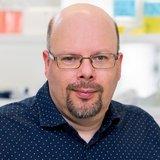
Dietmar Herndler-Brandstetter, Medical University of Vienna
Targeting the immunosuppressive tumor microenvironment using MISTRG-6 humanized miceDietmar Herndler-Brandstetter studied pharmacy at the University of Innsbruck, and obtained his PhD in Immunology at the Medical University Innsbruck. As a FLARE postdoctoral fellow, he continued his research on human T cell biology and aging at the Institute for Biomedical Aging Research in Innsbruck and the University of Birmingham, UK. In 2011 he joined the Richard Flavell lab at Yale University as an Erwin Schrödinger postdoctoral fellow. There he generated fate reporter mouse models to describe the plasticity of effector T cells and humanized mouse models to study novel cancer immunotherapies. In 2018 he joined the Center for Cancer Research in Vienna as a principal investigator. His lab is using humanized mouse models and patient-derived colorectal cancers (PDX) to reconstruct the patient’s tumor-immune microenvironment and to identify effective combination cancer immunotherapies.
About Dietmar’s research: Colorectal cancer (CRC) is the third most commonly diagnosed malignancy and the second leading cause of cancer-related deaths worldwide. The clinical benefit of currently available immune checkpoint inhibitors (anti-PD-1 and anti-CTLA-4) is limited to only 15% of CRC patients who have heavily mutated tumors (microsatellite instable). One of the reasons for the treatment failure is that available immunotherapies target only a fraction of tumor-infiltrating immune cells, such as T cells. Using multi-omics single cell and spatial profiling, we show that we can recapitulate patient tumor heterogeneity and immunosuppressive myeloid cell landscapes in our CRC-PDX MISTRG-6 humanized mice. Myeloid cells are highly abundant in CRC and play a key role in promoting angiogenesis, metastasis and resistance to PD-1/CTLA-4 immunotherapy. By reprogramming myeloid cells using first-in-class therapeutics and epigenetic modifiers in our CRC-PDX MISTRG-6 humanized mice we aim to understand and break immunosuppressive interaction networks in human CRC.
- 16:30 - 17:15 Uhr | “Fine-Tuning the Balance: The Modulation of B Cell Activation in Autoimmunity and Viral Escape“
Marta Rizzi, Institute of Immunology, Center for Pathophysiology, Infectiology and Immunology (CePII), Medical University of Vienna - 17:15 - 18:00 Uhr | “Massively parallel serology to deciphe human antibody repertoires against the microbiome in health and disease”
Thomas Vogl, Cellular and Molecular Tumor Biology, Center for Cancer Research, Medical University of Vienna - 18:00 - 18:30 Uhr | Get-together
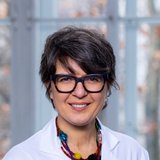
Marta Rizzi, Medical University of Vienna
Fine-Tuning the Balance: The Modulation of B Cell Activation in Autoimmunity and Viral EscapeAfter studying Medicine at the University of Genoa/Italy, Marta Rizzi completed her PhD in Clinical and Experimental Immunology in Genoa/Italy and San Diego/California in 2004. In 2007, she completed her residency training in Allergology and Clinical Immunology. After her Postdoc, she started her group in 2014 at the University Medical Center Freiburg. In 2014, she was awarded the prestigious Margarete von Wrangell fellowship.
Since 2022 she is Professor of Clinical and Experimental Immunology at the Medical University of Vienna.
She has been awarded the prestigious Heisenberg Professorship of the German Research foundation (DFG) and since 2023 she is also Professor for Experimental and Translational Rheumatology at the Faculty of Medicine of the University of Freiburg.
Marta Rizzi’s research focus is human B-lymphocytes development, maturation and activation in physiological and pathological conditions. She has developed unique expertise in in vitro modelling of early and late human B cell development.fter studying Medicine at the University of Genoa/Italy, Marta Rizzi completed her PhD in Clinical and Experimental Immunology in Genoa/Italy and San Diego/California in 2004. In 2007, she completed her residency training in Allergology and Clinical Immunology. After her Postdoc, she started her group in 2014 at the University Medical Center Freiburg. In 2014, she was awarded the prestigious Margarete von Wrangell fellowship.
Since 2022 she is Professor of Clinical and Experimental Immunology at the Medical University of Vienna.
She has been awarded the prestigious Heisenberg Professorship of the German Research foundation (DFG) and since 2023 she is also Professor for Experimental and Translational Rheumatology at the Faculty of Medicine of the University of Freiburg.
Marta Rizzi research focus is human B-lymphocytes development, maturation and activation in physiological and pathological conditions. She has developed unique expertise in in vitro modelling of early and late human B cell development.
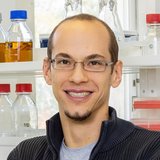
Thomas Vogl, Medical University of Vienna
Massively parallel serology to deciphe human antibody repertoires against the microbiome...Thomas Vogl obtained a PhD at the Graz University of Technology in Austria in the field of 'Molecular Biomedical Sciences and Biotechnology'. Having worked mostly on classical molecular biology "hands on pipetting" experiments during his initial training, he focused on bioinformatics and machine learning during postdoctoral work in Australia and Israel. Particularly in his work at the Weizmann Institute of Science he applied robotic pipelines to generate large datasets on the interplay of the human immune system and the microbiome (a summary term for all the microbes colonizing our bodies).
Since August 2022 Dr. Vogl is a group leader at the Medical University of Vienna and was awarded an assistant professorship. His work is funded by prestigious grants such as a Start Grant by the European research council, and is the coordinator of an EU funded research consortium "ID-DarkMatter-NCD" including partners from the Sorbonne in Paris, and the Karolinska institute in Sweden.
Program on September 18, 2025
- 16:30 - 17:15 Uhr | “T cell dysfunction in inflammation-associated skin cancer”
Iris Gratz, Department of Biosciences and Medical Biology, University of Salzburg - 17:15 - 18:00 Uhr | “HDAC1 controls the generation and maintenance of effector-like exhausted CD8+ T cells”
Shinya Sakaguchi, Department of Immunobiology, Institute of Immunology, Center for Pathophysiology, Infectiology and Immunology (CePII), Medical University of Vienna - 18:00 - 18:30 Uhr | Get-together

Iris Gratz, University of Salzburg
T cell dysfunction in inflammation-associated skin cancerDr. Iris Gratz is Associate Professor and Deputy Chair of the Dept. of Biosciences and Medical Biology at the University of Salzburg, Austria. After studying Biology and Genetics, completion of her PhD studies in Immunology and a PostDoc at the University of Salzburg, Iris moved to the United States in 2009 to join the Lab of Abul Abbas at the Department of Pathology of the University of California, San Francisco (UCSF). In the Abbas lab, she investigated tissue-resident regulatory T cells (Tregs) and made seminal discoveries in context with peripheral cutaneous Tregs in mice and humans. After becoming Assistant Adjunct Professor at UCSF in 2012, Iris returned to Austria in 2014 to accept a position as Assistant Professor at the Dept. of Biosciences at the University of Salzburg and as Affiliate Researcher at the EB House Austria at the University Hospital Salzburg. Since 2017, she has an appointment as Affiliate Investigator of the Benaroya Research Institute ad Virginia Mason, USA and since 2019, Iris holds her current Associate Professor position at the University of Salzburg. Today, the Gratz lab works at the intersection of autoimmunity, inflammation and cancer with a focus on the skin.
About Iris's research: Autoimmunity is caused by immune cells attacking harmless self-antigens (or commensal microbes) in host tissues, which they are supposed to protect. Conversely, cancer is a disease in which altered self-cells are not efficiently cleared from the tissue and are thus allowed to multiply. As a target tissue, we study the skin, a crucial barrier of the body against pathogenic invaders that is rich in immune cells. The principal goal of our research is to understand the role of cutaneous T cells and their cross-talk with skin structural cells in autoimmunity, wound healing and cancer. We utilize organotypic 3D-skin and tumor cultures and unique (humanized) mouse models to answer our basic research questions and perform preclinical studies. The overall goal of our group is to understand basic mechanisms of tissue immune regulation with the goal to lay the groundwork for novel therapeutic strategies to treat chronic and debilitating inflammatory skin conditions and skin cancer.
More info: http://www.uni-salzburg.at/gratz
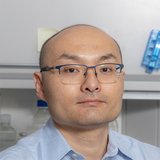
Shinya Sakaguchi
HDAC1 controls the generation and maintenance of effector-like exhausted CD8+ T cellsShinya Sakaguchi completed his Master’s degree in Medical Science in 2002 at the University of Tokyo. In 2004, he joined the PhD program in Molecular Biology at the University of Vienna, where he elucidated molecular mechanisms controlling T cell development. After completing his PhD, he worked as a Postdoctoral Fellow at the Institute of Immunology, CePII, Medical University of Vienna. He was appointed Assistant Professor at the Medical University of Vienna in 2016 and promoted to Associate Professor three years later. His research group currently focuses on elucidating the transcriptional and epigenetic regulation of cytotoxic T cell differentiation.
About Shinya’s research: CD8+ T cells play a central role during immune responses against viruses, intracellular bacteria and protozoan parasites, and are also key regulators of anti-tumor immunity. The main research topic of Sakaguchi lab is to understand the molecular mechanisms controlling the differentiation of peripheral CD8+ T cells, particularly focusing on transcriptional and epigenetic regulations. We are currently investigating the roles of BTB-POZ zinc finger proteins and histone deacetylases for memory and exhausted T cell differentiation. Moreover, we aim to identify novel transcriptional/epigenetic regulators controlling these processes. To address these research questions, we employ multi-color flow cytometry, next-generation sequencing, mouse viral infection and tumor models, biochemical/molecular approaches, retroviral-mediated gene transduction and CRISPR-mediated gene knockout in primary CD8+ T cells.
Program June 12, 2025
- 16:30 - 17:15 Uhr | "Determinants of pulmonary immune homeostasis”
Sylvia Knapp, Medical University of Vienna, Department of Medicine I, Research Division Infection Biology - 17:15 - 18:00 Uhr | "Regulatory T cells and Foxp3: programming immunological tolerance”
Joris Van Der Veeken, Research Institute of Molecular Pathology (IMP) - 18:00 - 18:30 Uhr | Get-together
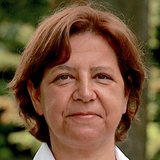
Sylvia Knapp, Medical University of Vienna
Determinants of pulmonary immune homeostasisSylvia Knapp, MD, PhD, is Professor of Infection Biology at the Medical University of Vienna. She studied Medicine in Vienna and Berlin, and is a board-certified Internist.
After her clinical training, Sylvia obtained her PhD at the University of Amsterdam, where she investigated pattern recognition receptors in bacterial infections. Between 2006 and 2021, she was Principal Investigator at CeMM and continued her clinical duties while also running her own lab. In 2012, Sylvia was appointed Professor of Infection Biology at the Medical University Vienna. She is highly committed to bridging academic medicine and basic science. She is a member of the Austrian Academy of Sciences and of Academia.Net circle of excellent female scientists. Sylvia is a member of the University Board of the Medical University of Graz, elected vice president of the Ludwig Boltzmann Society as well as the Viennese College of Physicians, and vice-dean of doctoral studies at the Medical University of Vienna.
About Sylvia’s research: Research of the Knapp lab concentrates on the innate immune response to infections, focusing specifically on the comprehensive repertoire of macrophage functions in development, health and disease. We study the initiation and resolution of clinically relevant infections, and the role of danger molecules and their interactions with host structures and pathways. Our latest research is directed towards the interplay of immune cells in regulating tissue homeostasis in health and disease. Innate immunity, the evolutionarily conserved arm of the immune system, is instrumental in maintaining tissue homeostasis while at the same time providing the tools to immediately sense and respond to danger signals such as invading pathogens, metabolic stress or injuries. This wide and diverse range of tasks requires an incredible plasticity and flexibility of the players involved, with tissue-resident macrophages being essential in orchestrating many of these responses. Using clinically relevant infection, injury and metabolic stress models, research in the Knapp-Lab focuses on how host factors can influence the balance of innate responses in steady state and upon danger.
More info: https://innere-med-1.meduniwien.ac.at/knapplab

Joris Van Der Veeken, Research Institute of Molecular Pathology (IMP)
Regulatory T cells and Foxp3: programming immunological toleranceJoris van der Veeken was born in the Netherlands and studied pharmacology at Utrecht University.
He then moved to New York for his PhD and postdoc in the laboratory of Alexander Rudensky at Memorial Sloan Kettering Cancer Center. Joris started his lab at the IMP in Vienna in 2021. His group is studying the molecular mechanisms underlying T cell differentiation and function.
About Joris’ research: Regulatory T (Treg) cells are a dedicated immunosuppressive T cell subset defined by expression of the lineage-specific transcription factor Foxp3. Treg cells are continuously required to keep the immune system in check and prevent the spontaneous onset of lethal multi-organ autoimmunity. How Foxp3 controls Treg cell differentiation is still poorly understood. The seminar will discuss the development of new genetic models to dissect the gene-regulatory functions of Foxp3 and its role in maintaining tolerance towards self-antigens, tumors, and the intestinal microbiota.
More info: https://www.imp.ac.at//groups/joris-van-der-veeken
Programme, May 15, 2025
- 4:30 - 5:15 PM | "T cell regulation by bacterial metabolites”
Clarissa Campbell, CeMM – Center for Molecular Medicine of the Austrian Academy of Sciences - 5:15 - 6:00 PM | "Metabolic regulation of tissue homeostasis by macrophages”
Thomas Weichhart, Institue of Medical Genetics, Medical University of Vienna - 6:00 - 6:30 PM | Get-together
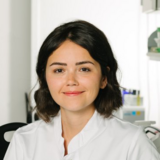
Clarissa Campbell, CeMM
T cell regulation by bacterial metabolitesClarissa Campbell studied biology with a minor in genetics at the Federal University of Rio de Janeiro (UFRJ) and subsequently earned a master’s degree from the Oswaldo Cruz Foundation (FIOCRUZ), investigating how bacterial molecules exert immunomodulatory effects on mammalian cells via nuclear receptors, a topic she would continue to explore throughout her career.
She joined the Tri-Institutional Immunology and Microbial Pathogenesis Program at Weill Cornell Medical College in New York as a graduate student where she specialized in mucosal immunology and regulatory T (Treg) cell biology. After obtaining her PhD, Clarissa Campbell remained under the mentorship of Dr. Alexander Rudensky at Memorial Sloan Kettering Cancer Center to continue her work on host-commensal interactions and pursue broader scientific questions bridging the fields of immunology and metabolism. Her research has characterized a circuit whereby microbial metabolites including short-chain fatty acids and secondary bile acids facilitate the differentiation of peripherally induced Treg cells, which in turn suppress immune responses to colonization and preserve a niche for a group of intestinal bacteria. More recently, she found that a bile acid-sensing nuclear receptor contributes to the cell-intrinsic responsiveness of effector T cells to fasting. Clarissa Campbell joined CeMM as a principal investigator in July 2021. Her lab is interested in investigating how changes in microbial and organismal metabolism contribute to regulating immune-cell function.
About Clarissa’s research: Our goal is to understand how immunity and metabolism are integrated at the organismal level. Adaptive lymphocytes of higher vertebrates play an essential role in immunity and perform extensive accessory functions that contribute to tissue homeostasis. Although the fundamental operative principles of immune cells are well characterized, many functional mechanisms still lack contextualization in physiological settings and therefore fail to yield novel concepts and therapeutic avenues. We are investigating how metabolic cues affect the differentiation and function of T cells. Our studies focus on the intestinal mucosa, where T cells are exposed to a myriad of microbial metabolites and dietary nutrients. We also want to understand how changes in organismal metabolism that occur as a consequence of gastrointestinal infections impact immune responses. Our group uses gnotobiotic husbandry, engineered bacterial strains, metabolomics and experimental infection to identify novel mechanisms contributing to the regulation of T cell function in physiological settings.
More info: https://cemm.at/research/groups/clarissa-campbell-group
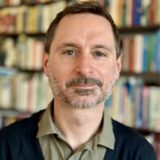
Thomas Weichhart, Medical University of Vienna
Metabolic regulation of tissue homeostasis by macrophagesThomas Weichhart studied biology and genetics at the University of Vienna and earned his PhD in 2005 under the supervision of Alexander von Gabain, identifying an endogenous ligand for TLR4.
Following a postdoctoral fellowship with Dr. Marcus Säemann at the Medical University of Vienna’s Institute of Nephrology and Dialysis, he established his independent research group and has been an Associate Professor at the Center of Pathobiochemistry and Genetics since 2014. As a principal investigator, he has contributed to understanding how metabolic pathways regulate immune function in health and disease. He currently coordinates an FWF-funded SFB consortium on immunometabolism.
About Thomas’ research: The immune system is tightly regulated by cellular metabolism, which dictates how immune cells respond to infections, cancer, and chronic inflammatory diseases. Dysregulation of these metabolic networks can cause diseases such as sarcoidosis, cancer, and autoimmunity. Thomas’s lab investigates how metabolic signals with a focus on mTOR and specific metabolites control immune cell function. Recent work has explored metabolic shifts in macrophages during granuloma formation in sarcoidosis and the therapeutic potential of mTOR inhibition. Additionally, his team examines how macrophage-derived metabolites influence tissue and immune cell function to regulate tissue homeostasis and the outcome of inflammatory disease.
More info: https://www.weichhart-lab.com
Programme, March 18, 2025
- 4:30 -5:15 p.m.
“SOCIAL IMMUNITY: the colony-wide immune system of insect colonies”
Sylvia Cremer
Institute of Science and Technology Austria, Klosterneuburg - 5:15 – 6:00 p.m.
“High Throughput Genome Engineering to Decode T cell Functions”
Ralf Schmidt
Medical University of Vienna, Department of Laboratory Medicine, KILM - 6:00 - 6:30 p.m.
Get-together

Sylvia Cremer, Institute of Science and Technology Austria (ISTA)
SOCIAL IMMUNITY: the colony-wide immune system of insect coloniesSylvia Cremer studied biology at the University of Erlangen, and received her PhD (Dr. rer. nat.) in 2002 from the University of Regensburg. After a postdoc at the University of Copenhagen and a Junior Fellowship at the Institute of Advanced Studies (WIKO) in Berlin, she performed her Habilitation at the University of Regensburg in 2010. Since then, she works at the ISTA (Institute of Science and Technology Austria) in Klosterneuburg, first as Assistant Professor, and since 2015 as Full Professor.
Her research was predominantly funded by the ERC, both by a Starting and Consolidator grant. She received multiple awards for her research, including the Walther Arndt Prize of the German Zoological Society DZG (2013) and the Elisabeth Lutz Prize of the Austrian Academy of Sciences ÖAW (2015).
Research
Sylvia Cremer’s research focuses on the cooperative disease defence of social insect colonies, particularly ants. In addition to the individual immune systems of all colony members, these collective and cooperative actions provide the colony with disease protection, or Social Immunity. The colony-level disease defences of social insects show an amazingly similar organisation to the immune system of individual organisms. This is because insect colonies form super-organisms, where the individual insects – just like cells within a body – specialise on either reproduction (the queen resp. germline) or maintenance (the sterile workers resp. soma). The fitness of each individual is therefore strictly connected to the overall fitness of the colony, promoting unconditional cooperation between colony members. This resulted in the evolution of highly sophisticated colony disease defences, including hygienic suicide by social apoptosis and altruistic ‘find me and eat me’ signalling of infected individuals.

Ralf Schmidt, Dept. of Laboratory Medicine, Medical University of Vienna
High Throughput Genome Engineering to Decode T Cell FunctionsRalf’s lab focuses on developing and applying genome engineering approaches to better understand T cell biology and help design novel therapeutics. During his postdoc in the Marson lab at UCSF and Gladstone Institutes, he contributed to establishing large-scale CRISPR screening platforms in primary human T cells. Currently, his group at MedUni Vienna aims to further develop genetic tools to study fundamental T cell functions and potentially improve cell therapies. The Schmidt lab is particularly interested in deciphering the genetic code controlling T cell responses and rewiring regulatory circuits to enhance their therapeutic potential in cancer, autoimmunity and beyond.
